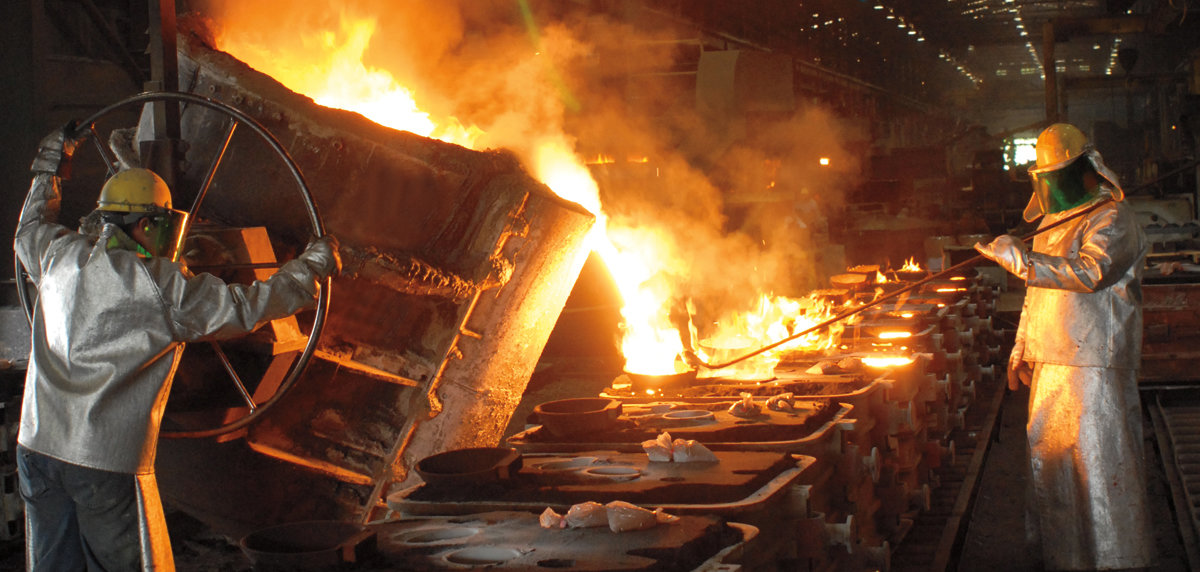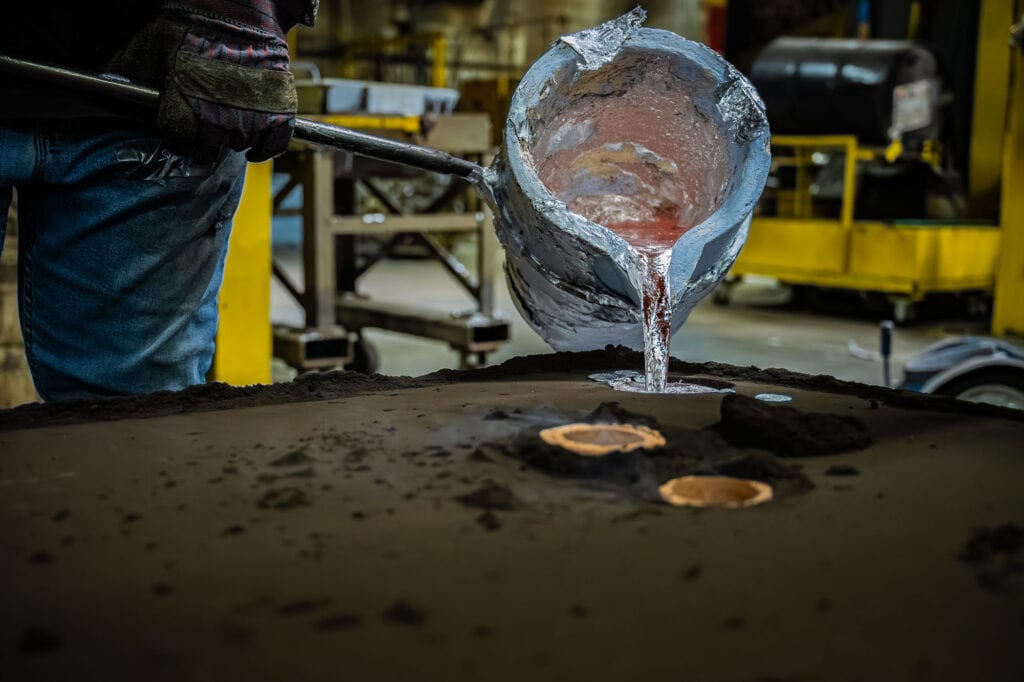How a Metal Foundry Adds to Lasting Metal Manufacturing Practices
Metal foundries play a vital duty in advertising sustainability within the metal production industry. By integrating recycled materials, they minimize dependence on virgin resources and reduce ecological influences. Energy-efficient melting procedures further minimize energy usage and discharges. The journey towards sustainable practices involves more than just recycling and energy management. It encompasses a wider dedication to honest sourcing and innovative technologies. The ramifications of these practices are considerable and warrant better assessment.
The Function of Recycling in Metal Foundries
While metal production has traditionally counted on virgin products, the raising focus on sustainability has actually caused a considerable shift in practices, particularly in metal foundries. Recycling has actually arised as an essential part of this improvement, permitting foundries to repurpose scrap metal and lower dependence on mined resources. By incorporating recycled products into their procedures, foundries not just reduce environmental influence however likewise lower production prices.
Using recycled metals, such as copper, aluminum, and steel, lessens energy intake and minimizes greenhouse gas discharges related to standard mining and refining methods. Foundries can attain premium outputs by using advanced sorting and handling technologies to ensure the pureness of recycled materials. This focus on reusing fosters a circular economic climate, where waste is lessened, and resources are utilized effectively. Consequently, metal foundries play an essential role in promoting lasting methods within the metal production industry.
Energy-Efficient Melting Strategies
Energy-efficient melting methods are vital for improving sustainability in metal production. These techniques considerably decrease energy consumption throughout the melting process, which is just one of one of the most energy-intensive phases in metal production. Technologies such as induction melting, resistance home heating, and microwave melting deal boosted effectiveness contrasted to traditional techniques. Induction melting, as an example, uses electromagnetic fields to generate heat directly within the metal, reducing power loss and giving precise temperature control.
Additionally, executing warm healing systems can additionally boost efficiency by reusing and capturing waste warmth created throughout melting. Using advanced insulation materials and maximizing heating system styles likewise add to energy savings. By embracing these ingenious melting methods, metal foundries can reduce their carbon footprint, reduce functional prices, and add to a much more sustainable manufacturing landscape. The integration of energy-efficient techniques not just lines up with environmental goals yet likewise satisfies the growing need for accountable manufacturing techniques in the metal industry.
Lasting Sourcing of Raw Products
Sustainable sourcing of basic materials is essential for minimizing the ecological effect of metal production. This entails the raised application of recycled steels, the adoption of moral mining methods, and initiatives focused on regional sourcing. By prioritizing these strategies, the sector can promote accountable source administration and support local economic situations.

Recycled Metal Usage
How can industries properly reduce their ecological effect while fulfilling the expanding need for metal? One significant technique is the use of recycled metal. By incorporating scrap metal right into their manufacturing procedures, foundries can decrease the extraction of virgin products, thereby decreasing and saving all-natural sources power consumption. Recycled metals call for less energy to process compared to their raw equivalents, bring about lower greenhouse gas exhausts. In addition, the usage of recycled metal aids draw away waste from landfills, promoting a circular economic climate. Industries that focus on recycled metal not just add to sustainability yet likewise take advantage of cost financial savings associated with lowered material purchase. Recycled metal usage stands as an important technique for ecologically responsible metal production.
Ethical Mining Practices
While the need for steels remains to increase, sectors are increasingly recognizing the relevance of moral mining techniques in making certain liable sourcing of raw products. Honest mining includes a commitment to environmental stewardship, social duty, and adherence to reasonable labor practices. Firms are now prioritizing collaborations with mines that show openness in their operations, decreasing eco-friendly effect and respecting neighborhood neighborhoods. This method not only cultivates a sustainable supply chain but also boosts the track record of companies involved. By carrying out rigorous requirements and qualifications, sectors can deal with unlawful mining activities and promote the well-being of employees. Inevitably, ethical mining methods contribute markedly to an extra lasting metal production environment, straightening economic development with ecological and social stability.
Local Sourcing Initiatives

Advancements in Metal Casting Processes
Developments in metal casting processes are changing the market by incorporating advanced recycling strategies that decrease waste. Energy-efficient melting techniques are also being created to lower energy consumption throughout production. Additionally, using cutting-edge mold materials adds to improved performance and sustainability in casting procedures.
Advanced Recycling Techniques
Advanced recycling techniques are changing metal casting procedures, substantially improving sustainability in the market. These developments concentrate on recovering and reprocessing scrap metal, substantially decreasing waste and the need for virgin products. Techniques such as hydrometallurgy and pyrometallurgy make it possible for foundries to draw out beneficial metals from made use of elements, ensuring reliable source usage. Furthermore, advanced sorting and purification technologies improve the quality of recycled metals, making them appropriate for high-performance applications. This not just minimizes the ecological impact of metal manufacturing but additionally fosters a round economic situation by promoting the reuse of products. As these reusing techniques remain to develop, they assure to further enhance operations within foundries and add to a more sustainable metal manufacturing landscape.
Energy-Efficient Melting Approaches
While traditional melting techniques have long been the foundation of metal casting, current advancements have presented energy-efficient strategies that markedly minimize power consumption and discharges. Technologies such as induction melting and electrical arc heaters have actually acquired prominence, permitting for accurate control over temperature and reducing the requirement for nonrenewable fuel sources. These approaches not only boost energy efficiency but likewise promote faster melting times, which translates to decrease functional expenses. Additionally, technologies in heat healing systems enable foundries to capture and recycle excess warm produced during the melting procedure. This all natural strategy to energy management not only supports sustainable click here to read methods but also placements metal foundries as leaders in the shift towards greener production processes, better straightening with worldwide sustainability objectives.
Cutting-edge Mold Products
As the need for even more lasting and effective metal casting procedures grows, the expedition of ingenious mold products has actually become a focal point in the sector. Traditional mold materials often add to ecological obstacles, triggering the look for alternatives that lower waste and energy usage. Recent improvements consist of the development of recyclable composites and eco-friendly binders, which not just improve mold and mildew performance but additionally minimize environmental impact. In addition, the usage of 3D printing modern technology in mold and mildew production permits complex styles that reduce material usage and enable fast prototyping. These ingenious materials not just improve casting precision yet also straighten with sustainability objectives, showcasing the sector's commitment to reducing its carbon impact while maintaining top quality production requirements.
Lowering Waste Through Advanced Innovation
Ingenious modern technologies are transforming the metal manufacturing sector by considerably reducing waste and improving effectiveness. Advanced data analytics and machine understanding formulas allow foundries to optimize production procedures, lessening and identifying ineffectiveness scrap product. Smart sensors keep an eye on equipment performance in real-time, permitting predictive maintenance that reduces downtime and waste generation. Additionally, additive manufacturing methods, such as 3D printing, permit the development of facility parts with minimal material usage, considerably decreasing waste compared to standard approaches.
Closed-loop systems are becoming extra common, where scrap metal and by-products are reused back into the production cycle, making certain that materials are made use of to their fullest potential. This integration of innovation not only advertises source preservation however additionally enhances the overall sustainability of metal production techniques. By accepting these developments, foundries can add to an extra sustainable future while preserving competition out there
The Effect of Foundries on Carbon Impact Decrease
Foundries play an essential duty in lowering the carbon footprint of the metal production market by applying numerous sustainable techniques. By utilizing energy-efficient innovations, such as electric arc heating systems, these facilities substantially reduced greenhouse gas exhausts contrasted to standard approaches. Additionally, foundries increasingly adopt eco-friendly power click resources sources, which also diminishes their reliance on fossil fuels.
Recycling scrap metal is another important technique that foundries employ, conserving resources and lowering the need for virgin materials. This not only minimizes waste yet also cuts down on the energy-intensive removal procedures connected with mining. Additionally, the adoption of closed-loop water systems helps to decrease water use and lower wastewater discharge, contributing to a much more sustainable operation.
With these campaigns, foundries demonstrate their commitment to environmental stewardship, causing a marked decrease in the general carbon impact of the metal manufacturing market. Their recurring efforts are pivotal in the shift toward an extra lasting commercial landscape.
Often Asked Questions
What Kinds of Metals Are The Majority Of Frequently Recycled in Foundries?
Light weight aluminum, copper, steel, and brass are among one of the most typically recycled steels in foundries. These steels are preferred because of their high recycling rates, economic worth, and widespread accessibility, adding substantially to commercial sustainability efforts.
Exactly How Do Foundries Guarantee the Top Quality of Recycled Materials?
Foundries determine the high quality of recycled materials through strenuous testing, sorting, and filtration processes. They implement sophisticated site here technologies to examine composition and remove pollutants, guaranteeing that the recycled metals fulfill market criteria for efficiency and safety and security.
What Qualifications Exist for Lasting Foundry Practices?
Different certifications exist for sustainable foundry practices, consisting of ISO 14001 for environmental management, ISO 50001 for energy administration, and LEED qualification for sustainable structure methods (Metal Foundry). These certifications assist guarantee adherence to ecological and sustainability criteria in procedures
Just How Do Foundries Determine Their Carbon Impact Decrease?
Foundries gauge carbon footprint decrease through devices like lifecycle evaluations, power audits, and exhausts tracking systems. They compare baseline discharges to existing outcomes, examining improvements in energy performance, material usage, and sustainable energy adoption gradually.
What Are the Financial Advantages of Sustainable Metal Production?
Lasting metal production provides financial benefits such as lowered operational prices, enhanced performance, boosted market competitiveness, and prospective government rewards. Furthermore, it fosters advancement and attracts eco aware customers, inevitably driving long-term profitability for organizations.
Metal foundries play a vital function in promoting sustainability within the metal production sector. While metal production has commonly depended on virgin materials, the raising focus on sustainability has actually led to a significant shift in techniques, particularly in metal foundries. By including scrap metal into their production processes, foundries can decrease the removal of virgin materials, thus preserving natural resources and lowering energy usage. Foundries play a necessary function in lowering the carbon impact of the metal production market by carrying out numerous lasting methods. Reusing scrap metal is another vital method that foundries use, preserving resources and lowering the demand for virgin materials.